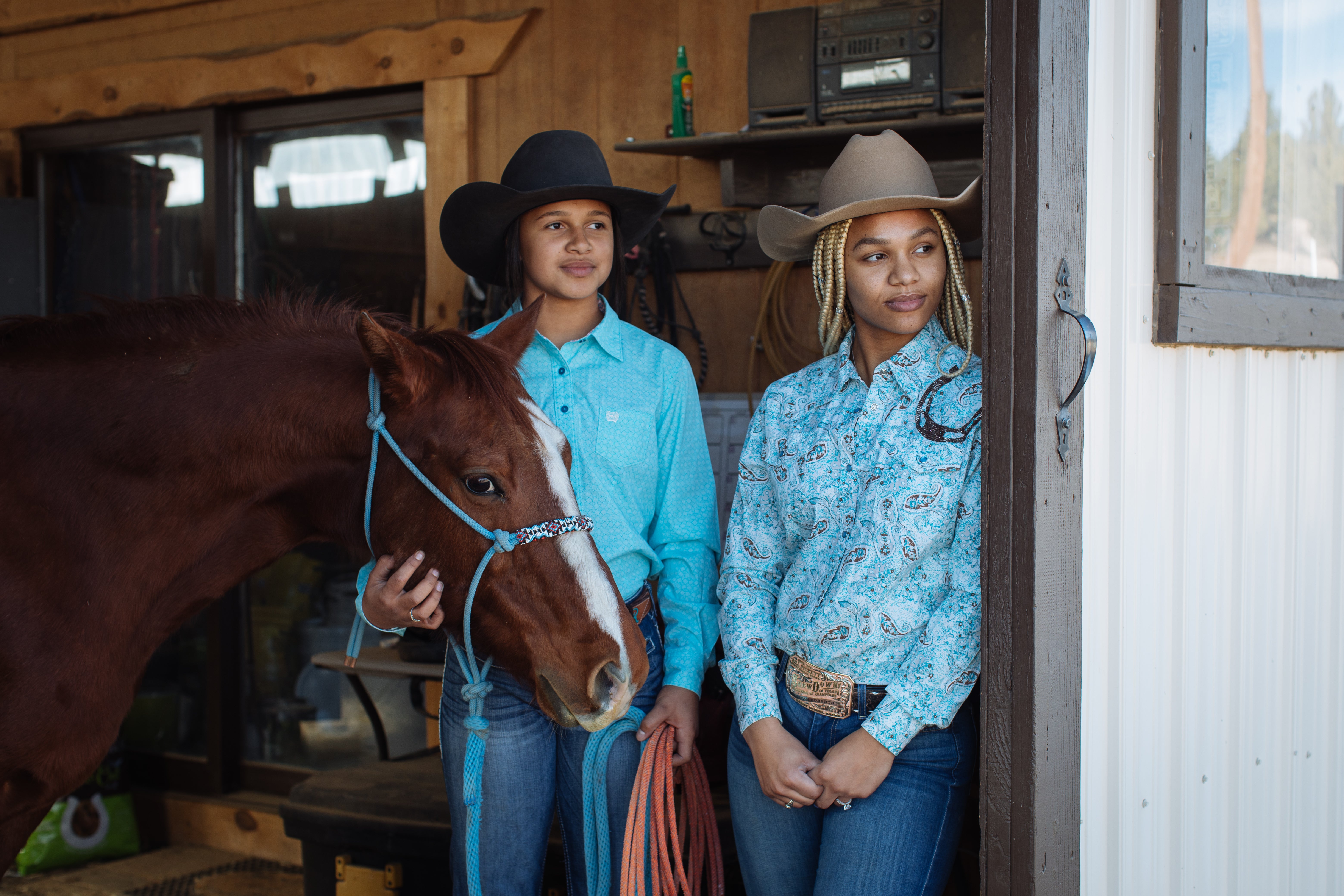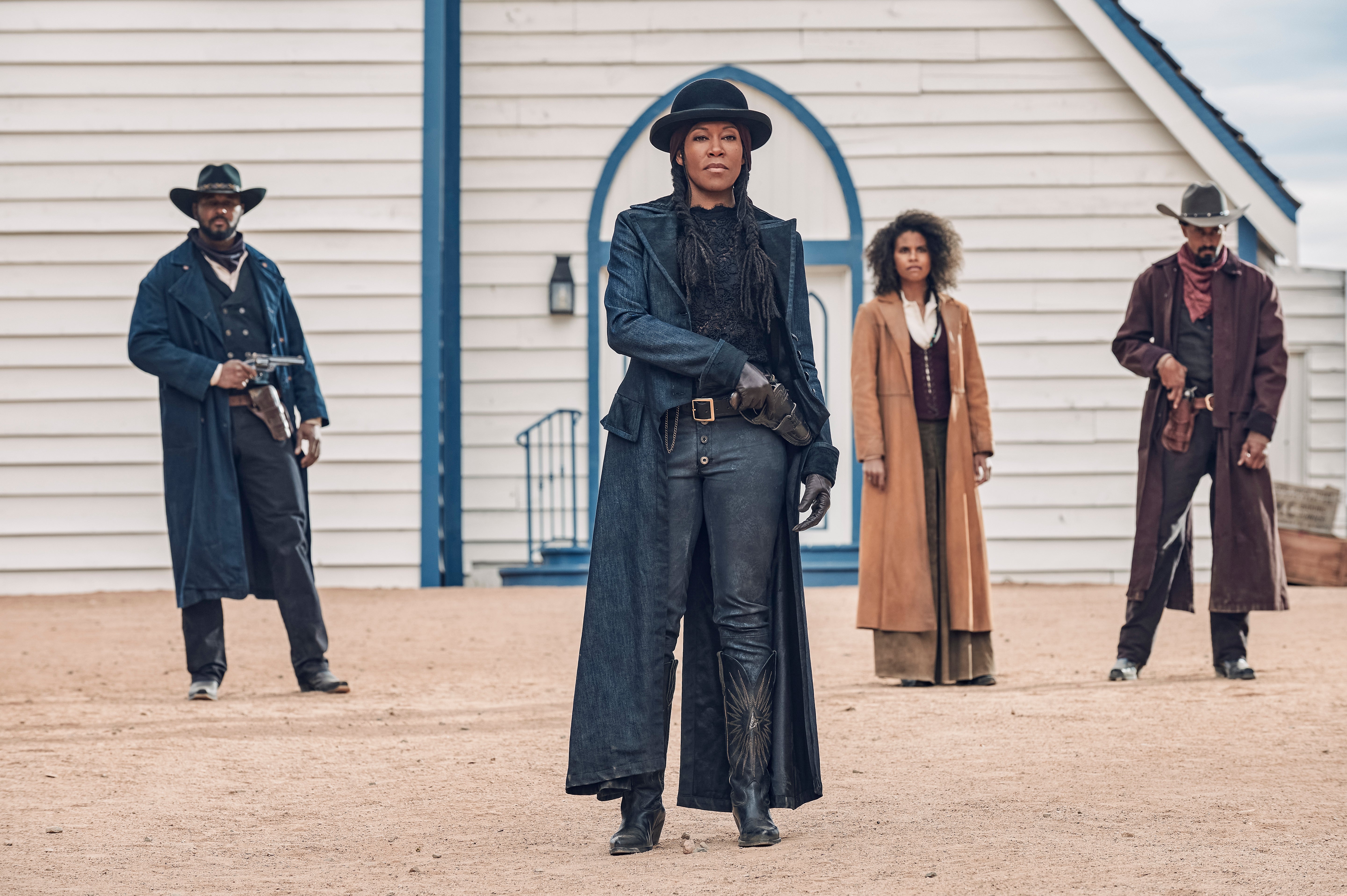The Black female rodeo riders redefining American cowboys: ‘They’ll give you looks until they see you compete’
For more than a century the cowboy has been portrayed only as a white man. Annabel Grossman meets some of the Black horsewomen challenging that perception – and reclaiming the true history of the Wild West


By the age of 10, Savannah Roberts was already a familiar face on the rodeo circuit, running barrels on her pinto-coloured pony Nacho. Now at just 15, she has cabinets filled with belt buckles and a room full of trophies won at rodeos across the United States, with titles including the Bill Pickett Invitational Rodeo Women's World Champion to her name.
But the teenager notes that despite her impressive record at such a young age, many people won't have ever seen a rodeo rider like her.
“There are a lot of kids that don't even know that Black cowboys exist,” her sister Aleeyah, 21, explains.
Both Savannah and Aleeyah ride and train their horses at their family's farm in Colorado Springs, but they compete across the country where they say they are often met with questions about how they started riding rodeo.

Aleeyah says: “I am happier than anyone to answer them because I want to see all kinds of kids rodeoing regardless of skin colour.”
Among their many trophies and awards, Aleeyah and Savannah agree that the most meaningful are the ones they have won at the Bill Pickett Invitational Rodeo.
The rodeo, which is the first all-Black touring rodeo, was set up in 1984 as a place to celebrate Black cowboys and recognise their contributions to building the west, while also providing a space for a new generation of rodeo riders to showcase their talents.
Aleeyah tells The Independent that growing up she and Savannah were almost the only Black girls riding in the Colorado Pro Rodeo Association (CPRA), so competing in the Bill Pickett rodeo for the first time aged 13 was an eye-opening experience.

“I won my first Bill Pickett rodeo ever and that was a pretty big deal because I didn't feel like I stood out anymore,” she says. “I felt like I blended in.”
The traditional image of the American cowboy popularised in Hollywood and TV westerns has historically been one that is white and male, with actors such as Clint Eastwood and John Wayne dominating the movie landscape.
The Black cowboy has been marginalised, if not rendered entirely invisible, in American cultural history, while women have also lacked serious representation, usually cast either as prostitutes or the fragile, virtuous love interest.
Yet ranchers in the 19th century would have relied on Black cowhands to herd cattle and train horses, and the now widely quoted figure is that one in four cowboys on the western frontier was Black.
Cowboy Nat Love, who picked up the nickname Deadwood Dick after winning a rodeo, was born into slavery in 1854 but became known as one of the heroes of the Wild West. He wrote about his experiences in an autobiography that included references to Old West legends such as Billy the Kid and Bat Masterson.

Another of the great Black rodeo riders was William “Bill” Pickett, who lent his name to the all-Black rodeo. A cowboy of Black American and Cherokee descent born in 1870, Pickett is recognised as the inventor of “bulldogging”, or steer wrestling, a technique involving jumping from a horse to subdue an unruly steer that has been adopted into modern rodeo and is seen all over the United States today.
It is even thought that The Lone Ranger – to many the quintessential Wild West hero – was based on a Black deputy US marshal named Bass Reeves who was born into slavery in Texas in the late 19th century and was known for fighting outlaws with legendary skill while never suffering a single gunshot wound.
Historians now believe that the term cowboy itself has racist origins, with white ranch workers in the 19th century being called “cowhands”, while Black workers were referred to as the more derogatory “cowboy”.
In recent years, popular culture has challenged the whitewashed image of the American cowboy. Lil Nas X's country-trap hit “Old Town Road” brought Black cowboy culture to the fore, while artists such as Cardi B, Megan Thee Stallion, Lizzo and Solange Knowles have sported the Wild West style with ten-gallon hats, rhinestones and fringed suede jackets. Since 2018, the “Yee Haw Agenda” – as Texas-based pop-culture archivist Bri Malandro coined the term – has been gaining momentum with an increasing number of Black artists and musicians adopting the western aesthetic and fashion brands employing the Black cowboy figure on the runway.
The shift away from the narrowly defined version of the white American cowboy has also been seen in Hollywood, with movies taking some, if limited, steps towards greater representation. Denzel Washington was cast as bounty hunter Sam Chisolm in the 2016 remake of classic western The Magnificent Seven, while Jamie Foxx starred in Quentin Tarantino's Django Unchained in 2012 and Samuel L Jackson played the lead role in the director's The Hateful Eight.
More recently, Netflix's western The Harder They Fall featured an all-Black cast and was based on real-life historical figures including Bill Pickett, Nat Love and Stagecoach Mary.

Known for her fearlessness – as well as her kindness and generosity to locals – the gunslinging, hard-drinking Stagecoach Mary, or Mary Fields, was born into slavery and became the first Black woman to work as a mail carrier for the United States Postal Service, a job that involved fighting off bandits and navigating brutal weather conditions.
Aleeyah worked as a stunt double for actress Zazie Beetz who played Stagecoach Mary in The Harder They Fall, and the moves she and Savannah perform on their horses wouldn't look out of place in the Wild West.
But for the sisters, being a cowboy is about more than the traditional image of the lassoing, gunslinging rancher of the western frontier.
Savannah says: “People have asked me at school: 'If you're a cowgirl then why don't you dress like one?'”

When competing, Savannah and Aleeyah are dressed every inch the traditional cowboy with their intricate belt buckles, embellished leather boots and Wrangler jeans.
Yet Aleeyah, who is currently studying biomedical sciences and psychology and works part time as a certified nursing assistant, says she is just as happy riding in scrubs when she's at home.
She explains: “From old westerns you see cowboys riding these horses, flying through dust, chasing people down with the gun that they pull out and spin on their finger and blow someone off their horse. It's a stereotype thing.
“But to me being a cowgirl is what's in your heart. It's how far you'll go to take care of your horses and how much you care about being a good competitor – not just the fastest competitor but the most professional one and a humble one.
“Many times in the past, I've sat kids down at rodeos and told them: it's not about how you look, it's about what you do, how you think, how you treat people – because cowboys and cowgirls are supposed to be people that talk to everyone the same and treat people the way they're supposed to be treated. To me it's a respect term.”
While employing the western aesthetic is a powerful homage to the Black influence on the American frontier, many riders today see their role as cowboys extending beyond the traditional Wild West trope.
In Los Angeles, the Compton Cowboys use their horses and the farming lifestyle to uplift their community, while one of the most striking images from the Black Lives Matter protests in 2020 was Black cowgirl Brianna Noble riding her horse Dapper Dan through the crowds in Oakland.
Since those powerful photos spread across the world's media, Brianna has found herself something of a spokesperson for the Black cowgirls, but she says that the term “cowboy” is one that she's still learning to understand herself.
Brianna, who trains horses at the Urban Cowgirl Ranch in northern California, says that like many Americans she grew up with a whitewashed view of horseback riding and as a young child she believed that Black people simply didn't ride horses.
“Horses have been my entire livelihood, but I did not see a Black person on a horse until I was nine or 10 years old when I went to the Bill Pickett rodeo,” she tells The Independent. “The first time I saw Black people on horses I was so taken aback and surprised.”
Although she's an experienced horsewoman and horse trainer, Brianna says that out of respect to the traditions and history of the ranchers who spent their lives tending cattle and working farmland, she is sometimes reluctant to refer to herself as a cowboy or cowgirl.

Yet as the United States moves towards using machinery and employing technical advances for farm work, she suggests that it's important to find a new way for horses to fit into modern society if riders are to preserve the cowboy culture.
“It's interesting to see how the word [cowboy] has grown and evolved and how it will continue to grow and evolve,” Brianna says. “This is a culture that was a life and a living for some people that has now become either Hollywood or sport. What a cowboy means is going to change – and if it doesn't it's going to die.
“My goal now is to give horses a new mainstream purpose. If we want our culture not to die it has to become mainstream.”
For Brianna, this involves using horses in the community and her Urban Cowgirl Foundation partners with organisations to help inspire positive change, particularly in urban and nature-deprived areas.
Brianna says she was shocked that the images of her riding Dapper Dan in the BLM protests went global, but it made her realise the impact that the image of a Black cowgirl could have in a world where historical statues and paintings almost exclusively portray white male riders.

She notes that in those photos “we’re taking what is normally a white male who's coming in to conquer and dominate and putting a Black woman up there. One who is basically leading the resistance and trying to make a change for what we believe is right.
“What I realised is that this is the coming of the new west. The west is changing and we have to change along with it.”
Aleeyah and Savannah's father Warren grew up on a ranch in Texas where horses were used for farm work rather than sport, and the sisters say that the way they are portrayed as cowboys now is different, although the skills may be similar.
As a 21st-century cowgirl, Aleeyah is devoted to rodeo, but she combines riding and training horses with studying full time and working part time. She usually works night shifts so she can fit her job in around schoolwork and horses, but says she enjoys the demanding schedule.

“I find a way to make it work,” Aleeyah adds. “It's a good balance because if I'm not busy or under pressure I don't do as well. I thrive under pressure.”
She now hopes to achieve a bachelor of science in nursing and go on to become a registered nurse specialising in cardiology, while continuing to ride rodeo and train her horses.
Historically, Black cowboys have suffered discrimination not just as ranch workers but also as rodeo riders, and Savannah and Aleeyah note that although they personally feel welcomed, racism does still exist in the sport.
They both recall hearing slurs and experiencing dirty looks while competing (from spectators rather than fellow competitors) but say that they've learned to deal with it by “killing them with kindness” and simply letting their skills speak for themselves in the ring.
Savannah says: “If they give me a dirty look, I just smile and move on. They'll give you looks until they see you compete.”
“We've both learned a lot,” Aleeyah adds. “It's been really humbling and educational whether it's negative or positive. And nothing negative has ever been able to ruin us. It's always been followed by something brighter.”
Join our commenting forum
Join thought-provoking conversations, follow other Independent readers and see their replies
Comments
Bookmark popover
Removed from bookmarks